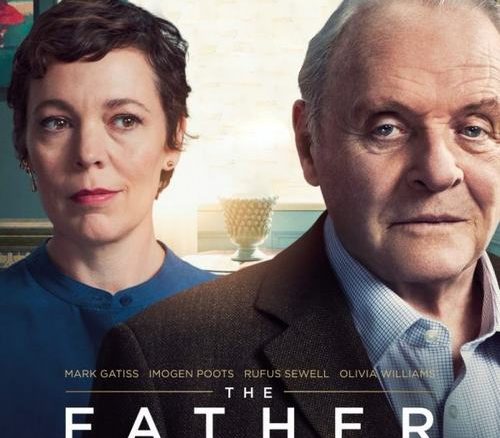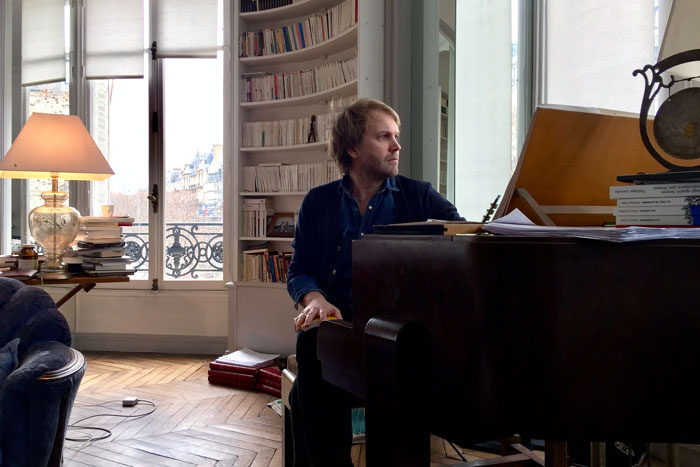
Thank you to Jason Quirk from Cult Film Alley for this review of the film The Father
*contains spoilers
I went to my favourite local cinema early to get a ticket for The Father (2020) starring Anthony Hopkins as a man battling dementia and I sat in the deserted Gold Class lounge overlooking the trees across the road. There is a long line of trees and through the windows you cannot see the road but only the trees. I just sat and stared at the leaves blowing on the branches like I was a 12-year-old who was once bored in class and watched the dead leaves blow around the yard outside the schoolroom… I had left my phone at home and so wasn’t adhered to its screen to kill time… But these were green trees of present and, in the leaves, as they blew upon the branches, I saw various images, including one of an ape gorging on meat as if it were sitting in and a part of the tree itself. This, of course, led me to think of the Ent or the Ents from The Lord of the Rings book and the spirits dwelling in the trees themselves. Ent of course is the shortened version of entertainment which relates to cinema, television and music and it seems that’s all people who are old and alone win… that and the ensuing dementia of old age. Perhaps all the young also win is entertainment.


This leads back to The Father and the quite masterful performance by Hopkins as he plays a man who is called Anthony just like himself and through the words of the play by Florian Zeller who has written the screenplay with the very experienced Christopher Hampton (1946-) who has been responsible for such plays as Dangerous Liaisons (1988) and the screenplay for Atonement (2007). Both were Oscar nominated.


Hopkins is a man who is obsessed with the possible loss of his independence in his flat as well as his wrist watch half the time in this movie where the key word behind the scenes is alienation. He is a man who seems to be hallucinating half his present lifetime as his daughter played by Olivia Colman (1974-) may or may not be moving to Paris with her new partner while Hopkins may still be living in his own flat or may be staying with his daughter in hers or he may even be thinking of the past while living in a nursing home. It’s confusing all the time and thus the wristwatch takes on significance amid the alienation. But the film’s alienation isn’t necessarily annoying but it can be disorienting.
It is set in London during the summer months and there is some opera which Hopkins listens to and this seems to keep him on an even keel, although the CD player is acting up while he wears his headphones and may be giving up the ghost just like Hopkins’s mind himself. The famous piece by Vincenzo Bellini (1801-35 dysentery) which was used in Atlantic City (1980) is used again in this movie, although it is the Maria Callas (1923-77 heart attack) version used in this film and not a cheap substitute. The Father has an operatic quality as a result of these bursts of classical music as Hopkins we learn is truly suffering from dementia… and the film is a kind of epic meditation over a mind which is starting to fragment.

When I saw one of the trailers, I thought it was going to be a film about gas-lighting by the new partner of his daughter played by Colman but I couldn’t be farther wrong. There is possibly no real way to reproduce what must be the horror of the forever growing epidemic of dementia as the population ages and more people suffer from the malady. But this film shows an individual’s possible perspective.
Hopkins enters rooms and finds that there are strangers sitting in the chair of his flat and yet it turns out it is not a stranger at all but the husband of his youngest daughter and the place where he is isn’t even his own flat but his elder daughter’s flat. There are scenes where the main actors in the movie seem to be playing other characters including ones that are dead but that is a part of the world he inhabits. It is a world which increasingly frustrates Hopkins at times as he swears his daughter’s new partner stole his watch and also has the balls to even wear it in front of Hopkins as he relaxes in a chair and enjoys a glass of wine.
“I suppose you’ve got the receipt,” says Hopkins about the imagined theft of the watch to the man played by Rufus Sewell (1967-). We are watching a play and it is well put together as a kind of a puzzle in which Hopkins tries to keep his wits and not break out into angry fits of frustration.


This is apparently a part of growing old and senile and it is handled well as the audience themselves are alienated by the change of actors playing what seems to be one character. It gives you all the more reason to want to die in your sleep or have insight enough to put yourself in line for voluntary euthanasia. This is the tragedy of dementia and the reason why this film will not be a massive hit at what passes for the cinema box office today. I know my father, who is in his late 70s, refuses to see this film as he has dementia in the family tree and I think of the Ent again – the tree. Will I also have to suffer the same humiliation and degradation of living without my mind in a nursing home in a room at the end of the hall with no one coming to visit except for the nurses with their medication. There is the hope of a trip to the park on the agenda for Hopkins with a carer… and in the end it is the front-line carers that matter most in terms of people with dementia. As long as they don’t bash your and tie you to a chair … Or leave you with maggots living in your rotting leg or in your ears. These are cases I’ve read in the media locally.
It’s just that Hopkins with his generally abrasive personality may possibly end up in the locked ward and not in the general peace and solitude of the room at the end of the hall. I remember my great aunt Pat ended up locked away after she threw a chair at a visitor one day after losing her mind altogether.


The Father is a type of letting go movie for those who have parents with dementia. There is no way you can live with their demented behaviour day in and day out no matter how sad it is and how sentimental you are about your immediate family. It leads to Colman’s character possibly suffering depression herself as she ponders going to live in Paris… We really don’t know if she does live in Paris in the end or if she just lives round the corner from Hopkins’s nursing home and refuses the visit regularly.
Hopkins has no friends to speak of, he only has his operatic music. There is no mention of his wife living or dead… There is no television playing in the background where Hopkins lives in this movie. Hopkins doesn’t like his entertainment in that form as he prefers to wander from room to room and annoy people to distraction with his odd reactions to certain situations. We are given some insight into the motivation of Hopkins’s behaviour as there is a kind of logic to it all, but it is fragmented and ends in confusion or anger for himself and others.

The question of the front-line worker as carer in the case of those who are headed for the locked ward and oblivion is shown at the end of the movie when Hopkins breaks down and asks for his mother to come and pick him up in tears like a small child. He had earlier watched a boy play with a plastic bag and that plastic bag could almost be a symbol of the film American Beauty with the plastic bag which floats through the air and is captured on video tape. It is the Ent again and I am reminded of seeing myself again as I was a pre-teen fascinated by those leaves blowing in the wind instead of concentrating on my lessons… I was and perhaps still am a dreamer. Hopkins still has the ability to recognise beauty even if his life is about to turned upside down perhaps by the fact that he can no longer listen to his CD player and the music which keeps him contented and sane.
The nurse takes Hopkins in her arms as he cries and calls him baby and tells him it is all right. It is the same actress who has played his younger daughter in earlier scenes and may or may not have been killed in an accident.
Previous to this as the movie ends, Hopkins tells us that he feels like a tree stripped of its leaves in a storm and he is bereft as a result. It is a horrifying vision of what may be to come for those with dementia in their family tree and even a broken coffee cup instilled horror into a woman sitting beside me as it fell from the sink as the depressed Colman pondered what she is going to do with her father.
The beauty of the movie in the end is summed up by Hopkins being calmed by the nurse as the camera looks out of the window at the trees full of leaves. It is the end of the line for Hopkins in this room with a view. The Ent outside the window as opposed to a television set in his room is ever present. His spirit is intact in this ageing Anthony while his mind is not.
If Hopkins were not to give another performance, he would end with this one while still at the height of his powers despite nearly being in his mid-80s. You see the odd flash of Hannibal Lector but that’s only natural…

The elderly woman beside me told her female companion that she hopes she dies in her sleep after the movie and I tell them I would prefer to invoke the powers of euthanasia within our state should they be passed through parliament rather that end up like my great aunty Pat in the locked ward somewhere in outer London where she died. I asked the pair of women if they supported euthanasia and they were divided, while the one who didn’t like the idea said she had signed something saying she didn’t want life support or to be resuscitated. This while we walked out of the cinema…
In the end, I was haunted by those trees outside Hopkins’s windows and how I had thought of the Ent just earlier in the theatre lounge… and how it related to the nature of the play or the ‘ent’ or entertainment which I had just watched… There is still a sense of synchronicity which reaffirms that everything is all right.
SheSociety is a site for the women of Australia to share our stories, our experiences, shared learnings and opportunities to connect.

Leave a Reply